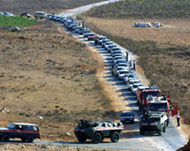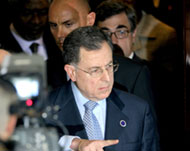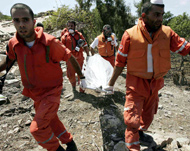Israel begins pullout from Lebanon
The Israeli military has begun its withdrawal from southern Lebanon, handing over positions there to a UN force for the first time.

“The process of transferring authority has begun,” an army statement said on Thursday. It said that an agreement had been reached after a three-way meeting between Israeli and Lebanese officers and a representative of the Unifil – the United Nations Interim Force in Lebanon.
More than 50 per cent of the area Israel holds has been transferred already, the army said. One area extends north and east of the town of Marjayoun and another further west.
Under a UN ceasefire agreement that has been in effect since Monday morning, Israel was to transfer control of its positions in southern Lebanon to Unifil, which would then turn it over to the Lebanese army.
|
“The process will be carried out in stages and is conditional on the reinforcement of Unifil and the ability of the Lebanese army to take effective control of the area” Israeli army statement |
“The process will be carried out in stages and is conditional on the reinforcement of Unifil and the ability of the Lebanese army to take effective control of the area,” the statement said.
The announcement came just after Tzipi Livni, the Israeli foreign minister, said that Israel was in no hurry to withdraw its forces.
“If there is a place that Israel can withdraw from and the Lebanese army can come, plus international forces, we’ll do it,” Livni said after a meeting with Kofi Annan, the UN secretary-general.
“But if it takes time until the international forces are organised, it takes time until Israel withdraws. This is the equation.”
While there are currently only 2,000 Unifil troops in the area, the Security Council resolution authorised up to 15,000 UN peacekeepers to help 15,000 Lebanese troops extend their authority throughout south Lebanon, which Hezbollah controlled, and called on Israeli troops to withdraw “in parallel”.
The aim is to create a buffer zone free of Hezbollah fighters between the Litani River, about 20km north of Israel, and the UN-drawn border.
Lebanese troops deployed
 |
|
Lebanon has ordered 15,000 |
On Wednesday, Lebanon had ordered 15,000 troops to move south to take full control along with UN peacekeepers, when Israeli troops withdraw after a 34-day war with Hezbollah guerrillas.
Lebanese troops would start deploying south of the Litani River on Thursday. The troops have a mandate to ban all armed groups in the area; but the Lebanese cabinet did not specifically say whether Hezbollah should disarm.
The cabinet, which includes two Hezbollah ministers, reached its decision only hours after Israel‘s army chief said that a possible pullout from the south within 10 days depended on the Lebanese army and a beefed-up UN force moving in quickly.
The United States welcomed the Lebanese move.
“It shows their commitment by a democratically elected government to holding the peace, to holding this cessation of violence, their willingness to act in accordance with the United Nations Security Council resolutions,” a spokesman for the state department told reporters.
Stand on Hezbollah
 |
|
Siniora said the army would |
A cabinet statement said that the army would not allow the presence of any armed group or any authority outside the jurisdiction of the state; but did not mention any withdrawal of Hezbollah’s fighters or the rockets they rained on northern Israel during the conflict.
“We have agreed to this decision without any reservations,” Mohammed Fneish, Lebanon‘s energy minister and an official of Hezbollah, told reporters after the cabinet meeting.
Fouad Siniora, the prime minister, said in an address to the nation: “The mission of the army in the south is to defend the rights of the citizens, the state’s right and obligations to extend its authority over all the nation’s territories … so that no weapons outside the state’s authority exist.”
Ghazi Aridi, the Lebanese information minister, said the army would confiscate any weapons found in the area, but also said: “There will not be any confrontation with the brothers in Hezbollah.”
Although there have been isolated incidents of violence, Israel and Hezbollah have generally maintained a fragile truce in the south since Monday. On Wednesday, an Israeli soldier shot dead a Lebanese civilian in the border village of Tair Harfa, a Lebanese security source said.
France said it was willing to lead a new UN force in Lebanon so long as it had a clear mandate and had sufficient strength. That pledge follows the adoption of a UN Security Council resolution authorising up to 13,000 well-armed troops to augment the 2,000-strong Unifil force now in Lebanon.
Tzipi Livni, the Israel‘s foreign minister, urged the UN force to enforce an arms embargo to prevent Hezbollah guerrillas from getting weapons from their backers in Iran and Syria.
“Nobody can talk of disarming Hezbollah when meanwhile we can see a process of rearming Hezbollah,” Livni told reporters at the United Nations. “There is a need for this disarming to be effective.”
Victims buried
 |
|
The truce allowed belated burials |
The truce has allowed belated burials of some war victims.
“It’s the first chance we’ve had. We’ve been on the road for 11 hours,” said Raouf Shayato, who arrived at Tyre hospital to collect the body of his cousin Nazira, killed on July 22.
More than 100 corpses lie unclaimed at the hospital mortuary. Officials postponed plans for a mass burial to give relatives more time to collect them.
Civilians have returned en masse without waiting for Israel to leave pockets of territory it has occupied in the south.
“If the Lebanese army does not move down within a number of days to the south … the way I see it, we must stop our withdrawal,” Dan Halutz, the Israeli army chief, said.
However, a senior Israeli government official, who asked not to be named, said Israeli forces would not withdraw completely until the expanded UN force and Lebanese army move in.
Hezbollah has promised to co-operate with Lebanese and UN forces, but has made clear it will keep its weapons – although political sources say it has offered to keep them out of sight.
Meanwhile, Ayatollah Ali Khamenei, Iran‘s Supreme Leader, praised Hezbollah and its leader Sayyed Hassan Nasrallah, saying in a letter to Nasrallah that the group’s “divine victory” over Israel was a victory for Islam.
The United Nations said it wanted to deploy up to 3,500 new soldiers in south Lebanon within two weeks.
Israeli objection
|
“If the Lebanese army does not move down within a number of days to the south … the way I see it, we must stop our withdrawal” Dan Halutz, the Israeli army chief |
Israel may oppose the inclusion of troops from countries that do not have diplomatic relations with the Jewish state.
Objections from Israel could complicate efforts to swell the UN force to 15,000. A senior UN official said he doubted enough nations would come forward to reach that goal soon.
Muslim-majority Malaysia and Indonesia have each offered to send 1,000 troops to Lebanon. They have no diplomatic ties with Israel and strongly support the Palestinian cause.
At least 1,110 people in Lebanon and 157 Israelis were killed in the conflict that erupted after Hezbollah captured two Israeli soldiers in a cross-border raid on July 12.
Amir Peretz, Israeli defence minister, has appointed a commission to investigate Israel‘s conduct of its war with Hizbollah, a ministry spokeswoman said.